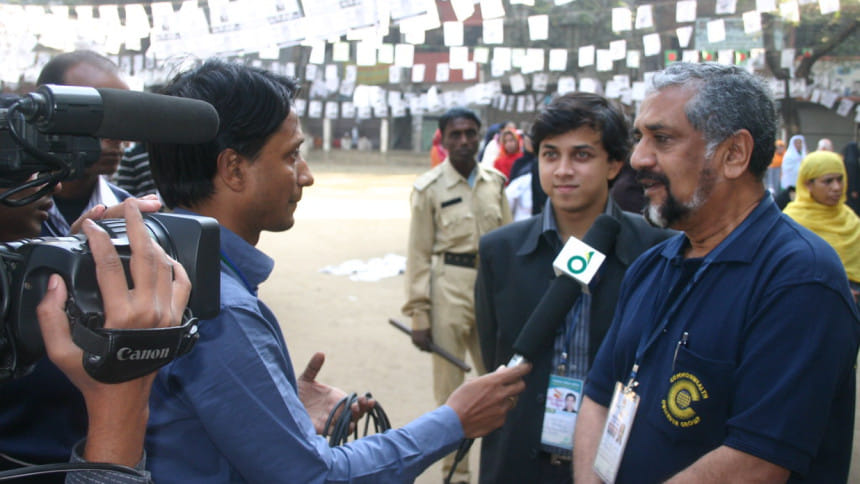Commonwealth’s legacy: The triumph and the future of Democracy

Democracy is the predominant and preferred form of government of the present world. According to Pew Research Center's 2019 findings, 57% of countries in the world have some form of democracy. But this was not the case even several decades ago. In the '70s, less than a quarter of the world (24%) was democratic.
The Commonwealth of Nations had a significant role in the upward trend of democracies since the mid-1970s. As an organization, it places a high value on development, democracy and peace. Democracy is one of the 16 core values enshrined in the Charter of the Commonwealth. In 1999, for a brief period, all Commonwealth countries were classified as democracies. The majority of its 54 members are still democratic today. After emerging as a secular democracy, the Commonwealth was one of the first international organizations for Bangladesh to join. In April 1972, Bangladesh became its 34th member.
Although the origin of democracy can be traced back 2,500 years to Ancient Greece, it was very different from modern democracy and, in some ways, completely the opposite. Modern democracy requires a constitution, equality before the law, individual and civil rights, liberties, and the rule of law to enforce those rights and liberties. Concomitantly, the government must be transparent and accountable. A notable feature of modern democracy is that there must be institutions of democracy outside the government, such as free and independent news media and widespread participation in labor unions.
Because of such detailed criteria and complex conditions, the transition to democracy happened gradually over time in the countries of Asia, Africa, and the Caribbean nations. In this arduous journey, the Commonwealth supported its members on being a community of peaceful and democratic countries, as well as actively promoted shared fundamental political values such as commitment to human rights, the rule of law, and civilian government. Through the Harare Declaration of 1991, the Commonwealth strengthened its operational support for democracy further. In a post-Cold War era, this emphasis on democracy and good governance was necessary.
The Commonwealth has always stood boldly against anti-democratic values and injustice. In 1986, the Commonwealth imposed a programme of economic sanctions against South Africa's apartheid regime. It galvanised international action against the apartheid rule and eventually led the way for a truly non-racial and democratic South Africa, under the leadership of Nelson Mandela.
Despite such remarkable achievements, global democracy is still far behind the utopian finishing line. In the 21st century, democracies around the world are now witnessing newer 21st-century challenges. We have witnessed the rise of populism that harbours and intensifies xenophobia and far-right extremism. The democratic institutions of the world are still perplexed with widespread fake news, the rise of techno-nationalism, and various forms of cyberattacks targeting democracy.
Then came Covid-19! In the grand play of history, there are decades where nothing happens; and there are weeks when decades happen. The coronavirus (COVID-19) pandemic was one such incident that threw our global system into a state of turbulence and on the verge of an economic spiral. It not only damaged global public health but also paved the way for anti-democratic powers around the world to seize the opportunity for "pandemic populism".
But now, the future of democracy depends on our vigilance. By building more comprehensive global connections we can stop the rising tide of fear-mongering and other elements that are dividing and tarnishing our democracies. Democracy, the rule of law, and fundamental rights are interlinked, interdependent, and mutually reinforcing. One cannot exist without the others. They should be promoted in a horizontal, integrated, and comprehensive manner. Different tools should be further developed to prevent possible deficits and tackle current and emerging challenges. A proactive and interdisciplinary approach is also needed, based on objective and verifiable data.
The Commonwealth and the 2.4 billion people living in it, especially the youth, have the biggest duty. A united Commonwealth can become a beacon for global democracy and set the example of ideal co-operation. The Commonwealth must stay united and vigilant, now more than ever, to protect and nurture true global democracy around the world. After all, democracy is not a destination, rather an ever-going journey.
The authors are researchers at Youth Policy Forum (YPF). Shah Minhaz Chowdhury is a final year student of Peace and Conflict Studies & Shamayla Mahbub is a final year student of International Relations at the University of Dhaka.

 For all latest news, follow The Daily Star's Google News channel.
For all latest news, follow The Daily Star's Google News channel. 



Comments